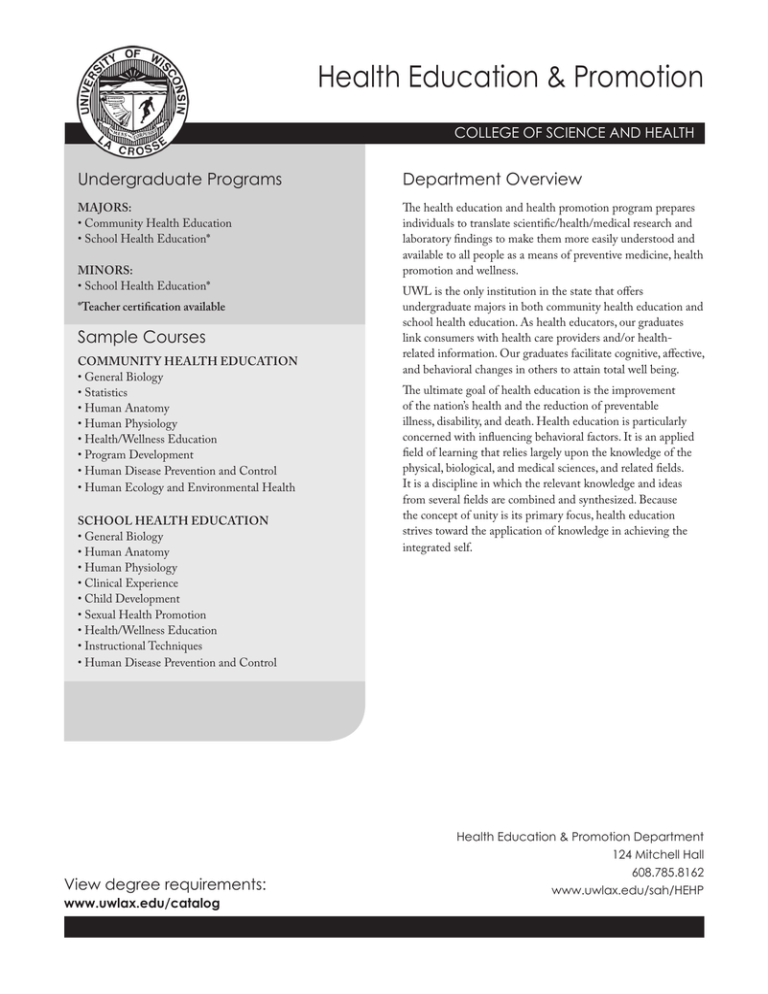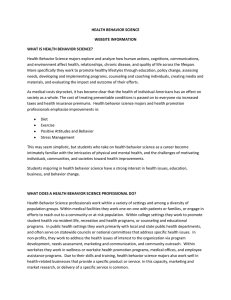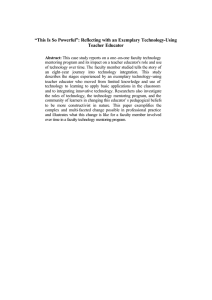Health Education & Promotion Department Overview Undergraduate Programs COLLEGE OF SCIENCE AND HEALTH
advertisement

Health Education & Promotion COLLEGE OF SCIENCE AND HEALTH Undergraduate Programs Department Overview MAJORS: • Community Health Education • School Health Education* The health education and health promotion program prepares individuals to translate scientific/health/medical research and laboratory findings to make them more easily understood and available to all people as a means of preventive medicine, health promotion and wellness. MINORS: • School Health Education* *Teacher certification available Sample Courses COMMUNITY HEALTH EDUCATION • General Biology • Statistics • Human Anatomy • Human Physiology • Health/Wellness Education • Program Development • Human Disease Prevention and Control • Human Ecology and Environmental Health SCHOOL HEALTH EDUCATION • General Biology • Human Anatomy • Human Physiology • Clinical Experience • Child Development • Sexual Health Promotion • Health/Wellness Education • Instructional Techniques • Human Disease Prevention and Control View degree requirements: www.uwlax.edu/catalog UWL is the only institution in the state that offers undergraduate majors in both community health education and school health education. As health educators, our graduates link consumers with health care providers and/or healthrelated information. Our graduates facilitate cognitive, affective, and behavioral changes in others to attain total well being. The ultimate goal of health education is the improvement of the nation’s health and the reduction of preventable illness, disability, and death. Health education is particularly concerned with influencing behavioral factors. It is an applied field of learning that relies largely upon the knowledge of the physical, biological, and medical sciences, and related fields. It is a discipline in which the relevant knowledge and ideas from several fields are combined and synthesized. Because the concept of unity is its primary focus, health education strives toward the application of knowledge in achieving the integrated self. Health Education & Promotion Department 124 Mitchell Hall 608.785.8162 www.uwlax.edu/sah/HEHP 47 Health Education & Promotion COLLEGE OF SCIENCE AND HEALTH Department Features Program Features The philosophy of health education is not directed at a high level of health simply for health’s sake, but rather to help each individual view health as a way of life that will help to attain individual goals and utilize one’s highest potential for the betterment of self, family, and community. The following values collectively reflect the philosophy of the UWL Health Education program: School Health Education majors are certified to teach K-12 health education in Wisconsin and other states. Students in the program study curriculum development, effective teaching, stress management, nutrition, physical fitness, human sexuality, the effects of alcohol and other drugs, and health promotion. In addition to classroom work, students complete more than 100 hours in schools prior to their student teaching or internship. ADDRESS CRITICAL HEALTH ISSUES Major health issues affecting our society can be addressed through health education. These issues include bioterrorism, HIV/AIDS, catastrophic illness prevention, lack of health insurance protection, violence, environmental hazards, and personal health issues such as depression, distress, and the affects of peer pressure. In many instances, health educators work as part of a team to develop multi-faceted approaches to prevention, disease control, and health promotion. INTEGRITY OF THE TOTAL PERSON Health needs of human beings are multidimensional. They include emotional, mental, social, and spiritual needs, as well as biological needs. If people are to attain optimum health, it is imperative that they become aware of and attempt to fulfill each dimension. All learning experiences in the Health Education program are based upon this principle. INNOVATION AND CREATIVITY In order to keep pace with and perhaps shape dynamic social change, an integral part of the preparation for the practice of health education involves innovation and creativity. INTERDISCIPLINARY PROFESSIONAL PREPARATION To explore health problems effectively in terms of the total person concept, health education curricula must be designed to include experiences from a variety of related disciplines. Such an approach will help facilitate students’ understanding of the many forces which influence the status of human health. RELEVANCE OF ACADEMIC ENDEAVORS TO SOCIAL NEEDS Meeting the health needs of a given population requires an understanding of the social dynamics taking place at the community level. Professional preparation in health should include a broad perspective of current social issues as they affect factors contributing to personal and community health. 48 Courses in the Community Health Education program emphasize program planning and implementation, marketing, health promotion, program evaluation, and administration. Graduates are prepared for careers in public or private health agencies, hospitals/clinics, and in business or industry. All students complete a one-semester preceptorship prior to graduation. ADMISSIONS REQUIREMENTS: Community Health Education – No formal application is required. School Health Education – All applicants must earn at least a 2.75 cumulative grade point average (on a 4.0 scale) and successfully complete a variety of introductory courses – including a clinical course in school health education. Students apply to the program after their sophomore year. Meeting minimum application requirements does not guarantee admission to the program. Health Education & Promotion COLLEGE OF SCIENCE AND HEALTH Career Opportunities Occupational Outlook ENTRY LEVEL Community Health Education •Communicable Disease Consultant •Community Health Educator •Community Organizer •Health Promotion Educator •Prevention Specialist •Public Health Educator/Worker •Public Health Inspector •Public Health Nurse (with nursing degree) • Worksite Health Promotion Coordinator As health care reform takes place and shapes the future direction of medicine and health, placing greater emphasis on health promotion and primary prevention, the role of the health educator will grow. Health education will expand in the future from the traditional settings and target groups to include pre-schoolers and the growing elderly population. School Health Education •K-12 Health Education Teacher (with teacher certification) •Curriculum Consultant FURTHER EDUCATION Community Health Education •Graduate study options include health education, business administration, biology, biochemistry and hospital administration. School Health Education •Graduate study in health education, health/wellness promotion, business administration, higher education, hospital administration LONG TERM CAREER DEVELOPMENT Community Health Education •Community Health Agency Administrator •College or University Instructor (with Ph.D. or P.H. degree) •Health Educator •Public Health Nurse •Researcher School Health Education •College or University Instructor (with Ph.D. or P.H. degree) •Curriculum Coordinator •Health Educator •Hospital Administrator/Health Promotion •School Administrator JOB TITLES OF GRADUATES Community Health Education • Communicable Disease Officer • Corporate Wellness/Fitness Educator • Family Planning Educator • In-service Educator in Health Care Setting • Paramedic • Public Health Inspector • Public Health Educator School Health Education • Assistant Coordinator of Education • Health and Wellness Promotion Consultant • School Health Curriculum Coordinator • School Health Educator • Underwriter of Health Insurance Professional Associations •American Alliance for Health, Physical Education, Recreation, and Dance •American Association for Health Education •American Public Health Association •American School Health Association •Society for Public Health Education





